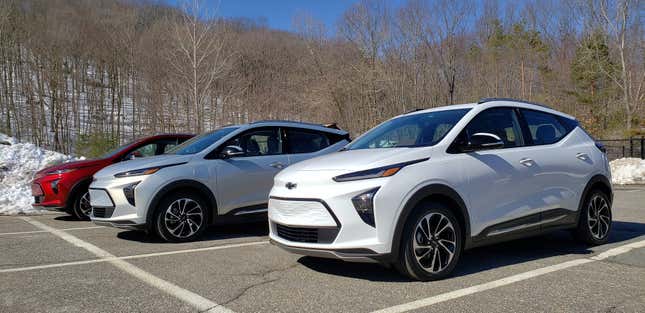
American car buyers have been participating in a slow and steady shift towards electrified vehicles. While our EV infrastructure and offerings still have a way to go, those who have recently bought a new electric car or plug-in hybrid may be eligible for some credits come tax time. But it all depends on what you bought and when you bought it.
For those of you about to file for the 2022 tax year who bought a car last year, there could be an extra $7,500 headed to your pocket from Uncle Sam — provided that you bought the right car at the right time.
Up until the signing of the Inflation Reduction Act in August of 2022, the eligibility for the Federal Tax Credit on EVs was fairly straightforward. According to the Internal Revenue Service, the requirements for an individual were that you must use the vehicle for personal use and it must be primarily used in the United States. For a vehicle to qualify, it must have been produced by an automaker that has sold fewer than 200,000 total units of electrified vehicles. Essentially, if you bought an EV that wasn’t made by Tesla or General Motors, you probably qualified.
Things got tricky when the Inflation Reduction Act was signed into law on August 16th, 2022. This bill eliminated the 200,000-unit cap on brand eligibility, which some viewed as punishing to those automakers that were quick to get EVs on the market. Most of the new rules put into place by the Inflation Reduction Act don’t go into effect until 2023, except the “final assembly” clause, which took effect immediately.
This clause excluded all electrified vehicles from qualifying for the tax credit if they were not produced in North America. Under the previous regulations, 75 electric vehicles on sale in the U.S. were eligible for the tax credit, but this new clause chopped the number of eligible cars down to 20. This new legislation was meant to encourage buyers to purchase EVs, particularly those build in the U.S., but it may have the opposite effect, since the final assembly clause combined with the battery sourcing requirements will have the long-term effect of disqualifying more EV models.
These new rules really threw a wrench into the plans of a lot of buyers who had EVs or PHEVs on order from any of a number of automakers, but were still waiting for those cars to arrive at dealerships. Luckily, the IRS made a contingency for those ordered-but-not-yet-delivered cars:
“If you entered a written binding contract to buy a vehicle before August 16, 2022, but took possession on or after August 16, 2022, and before January 1, 2023, you may claim the credit based on the prior rules and disregard the assembly requirement.”
A lot of dealers got wise to this, and described their “order deposits” as “binding agreements” to allow these customers to qualify, provided that they took delivery of the car before the end of 2022.
If you purchased an EV in 2023, or if you plan to, the effect of the Inflation Reduction Act on EV tax credits is still a bit murky. Between January and March of 2023, the Treasury Department delayed the implementation of the most stringent requirements of the bill, meaning cars that previously didn’t qualify may now qualify for the tax credit — if purchased within this timeframe. However, the MSRP caps of $55,000 on sedans and $80,000 on SUVs would still be in place.
One of the upsides to the Inflation Reduction Act is that it offers up to $4,000 in tax credits for buyers who purchase a used EV. However, there are some additional caveats: The vehicle must be at least, it must be purchased from a dealer, and the person filing for the tax credit must come in under one of the various income thresholds, depending on filing status.
Of course, this EV tax credit thing is just one more instance of American tax law being needlessly complicated. If you think you may qualify for an EV credit, it’s always wise to consult with a tax professional.
Tom McParland is a contributing writer for Jalopnik and runs AutomatchConsulting.com. He takes the hassle out of buying or leasing a car. Got a car buying question? Send it to Tom@AutomatchConsulting.com
